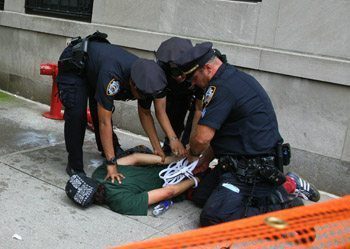Portia claims that there are over 3000 people falsely imprisoned in the UK and yet the general public remain largely unaware.
Stretched organisations across the UK help the families of those imprisoned to seek retrials and in many ways keep hope alive for those wrongly behind bars but is there anything we can do? Trebuchet magazine spoke to Dr. Andrew Green from Innocent to find out.
…
Trebuchet: Can you tell me about yourself and what drove you to co-found Innocent?
Dr. Green: I am and have always been an anarchist. One of the state's main justifications of itself is that it is needed to deal with criminals. So we anarchists are often interested in crime, punishment and the justice system. Researching miscarriage of justice cases has been a way for me to understand how the criminal justice system works. My doctoral thesis concerns the construction of wrongful convictions, and in particular the method of production of knowledge by the state which makes such events possible. Subsequently I published Power Knowledge Resistance: the epistemology of policing (2008). I continue to research this subject, and am currently working on joint enterprise cases, the construction of cases and case narratives.
Initially I joined an organisation based in Sheffield (where I live) called Conviction. We became aware of a lot of cases from the greater Manchester area, and I brought the families and supporters of those claiming to be wrongly convicted together in a private meeting in Manchester Town Hall, where they formed Innocent in 1993 (they chose the name). Innocent has met regularly ever since, and is currently thriving (due no doubt to such factors as changes in legislation, especially concerning disclosure, restrictions on legal aid for the defence, and police, CPS and judicial practices, which combine to supply us with plenty of cases). As always, the demands of families and supporters drives what Innocent does.
Meanwhile Conviction faded away – although very recently the number of cases in South Yorkshire has led to the formation of a new group here.
Trebuchet: What does Innocent aim to achieve and how does it do so?
Dr. Green: Innocent aims to overturn the convictions of people who are not responsible for the crime of which they have been convicted. It deals mostly with serious crimes, nearly all murders and sexual assaults. It seeks to raise public awareness of the problem of wrongful convictions of the innocent.
Innocent provides meetings in which families and friends of those claiming to have been wrongly convicted of serious crimes can talk freely about the cases and their own feelings about what has happened. It's a mutual self-help group, which pools experience and passes it on. We assess cases as best we can (given our very limited resources).
We explain how the appeals system works and discuss how to get the best results out of it. We advise on obtaining legal advice and help from experts, since we've come to know of the few good appeal lawyers and helpful experts in such subjects as forensic science and police investigations. We advise on publicity, and make use of our contacts with journalists.
We work with lawyers and experts, rather than independently on cases. We aim to enable families and supporters to work with professionals and to get the best results from them. We encourage families and people who are wrongly convicted to take control over their own cases, and to do work that is necessary to supplement what the lawyers do, since lawyers are limited by their narrow views, their competence, and funding restrictions.
For more than 12 years we've run the website innocent.org.uk which includes a vast amount of material and many useful links (though it needs improvements to make this material more accessible and useful).
We have held our own public meetings in Manchester, attended by hundreds of people (these have now been supplanted by UAI national meetings).
Trebuchet: Where is Innocent’s support base located, is it just in the UK? Or is it allied with groups around the world?
Dr. Green: Innocent is based in Manchester, and generally restricts its work to cases from Greater Manchester and the surrounding area. This provides us with more than enough cases and members. Mostly we only try to help when friends and families can attend our monthly meetings in Oldham, although sometimes we provide advice when people can attend neither our meetings nor those of our sister groups.
We find that many families of wrongly convicted people will do almost anything to help their loved ones and people have travelled from Birmingham, South Wales, Cumbria and the north of Ireland to attend evening meetings in Oldham. We have actively worked to help sister groups become established in London, Leeds and Birmingham, and are currently working on helping three others.
Last year the rapidly growing problem of the application of joint enterprise law which is leading to many wrongful murder convictions led to the creation of Joint Enterprise: Not Guilty by Association which we have actively supported, in the hope of helping with the many joint enterprise cases now coming to Innocent.
To raise awareness of the problem of miscarriage of justice, we joined with sister organisations Merseyside Against Injustice and Kent Against Injustice to set up an umbrella group United Against Injustice in 2001.
Our expertise is limited to UK criminal cases, so we do not make international links.
Since the idea of establishing innocence projects in UK universities was first proposed by our good friend Dr Michael Naughton of the University of Bristol, we have supported his work and the establishment of the Innocence Network UK. We work with individual innocence projects who take on cases we support. My main contact has been with the Sheffield University Innocence Project.
Trebuchet: Do all the affiliated groups co-ordinate support on a single day of action or is the support more based around sharing knowledge and procedures?
Dr. Green: United Against Injustice has now organised 9 annual Miscarriage of Justice Day meetings in different parts of the country. These have been attended by large numbers of people and we have attracted excellent speakers (more info at www.unitedagainstinjustice.org.uk ). With the growth in cases (particularly the joint enterprise cases which have multiple defendants – currently 21 youths are on trial for the murder of Sofyen Belamouadden at Victoria Station last year), our meetings are growing, and last year there was not room enough in the hall we booked. Although UAI is not ready to organise demonstrations itself, supporters came equipped with banners and at the end of the meeting set off in a spontaneous march from Covent Garden to Parliament Square, supported by prominent miscarriage of justice victims Sion Jenkins and Barry George.
Miscarriage of Justice Day takes place on the Saturday nearest to 11 October each year, each time at a venue in a different part of the country (Leeds, Manchester, Liverpool, London, and this year, Birmingham). Mornings include skill and information sharing workshops, and afternoons are filled with large meetings, usually chaired by Bruce Kent and featuring speakers from our own ranks and experts of very high standing – I'm amazed at who agrees to come, since we never pay them anything in practice. They talk individually to people about their cases, and take on case reviews pro bono.
Trebuchet: How certain are you of a person’s innocence (that you support through the Innocence organisation)?
Dr. Green: Some of the cases we do analyse in detail, but mostly we have to satisfy ourselves that a case is worthy of our support from other indicators. Usually there is little to be gained and much to be lost by anyone who continues to claim innocence once they are convicted. Some of those with life sentences face the likelihood that the rest of their lives will be spent in prison as a consequence of maintaining innocence.
Since it is very hard to overturn a conviction, I doubt that we are likely to succeed helping someone who is actually guilty to overturn theirs. But certainty is not available to us in any case. Sometimes all I can say is that evidence in particular cases is insufficient to maintain a conviction, and since the person convicted says they are innocent, then I must presume they are innocent. In a few cases, I am as certain of the person's innocence as surely as I can be of anything I know, so I feel able to declare without reservation that that person is innocent.
Trebuchet: How do you define Innocence; legally or morally?
Dr. Green: We would never support cases based on legal technicalities alone. We need to be convinced of the actual innocence of the person convicted. So that would be a moral rather than a legal position, since appeal outcomes depend on the technical 'safety' or otherwise of convictions, while we ask for more than that.
However appeals which succeed on technicalities may occur in genuine cases of actual innocence. So we do sometimes support appeal cases based on technicalities. These days the appeal court often orders retrials, at which more solid evidential matters are considered in detail. I like to think that I think of innocence in practical, rather than moral, terms, but neither I nor anyone else in Innocent would want to assist in overturning the conviction of anyone who had actually committed any of the appalling crimes we are asked to consider (despite my personal lack of faith in the criminal justice and penal systems' ability to deal competently with crime, punishment or rehabilitation).
Trebuchet: What are some of the successes that Innocent has achieved?
Dr. Green: As listed on the website, successful appeals include Kevin Callan, Dave Wood, Adrian Maher, John Brannan, Bernard Murphy, Graham Huckerby, Shay Power, Suzanne Holdsworth and Ian Lawless. Successes are not achieved solely by Innocent, and it's hard to assess who achieves the most – Innocent, the lawyers, the miscarriage of justice victim her- or himself. There have also been three or four successes with cases before or at trial, which I can't name.
Some cases, such as that of Susan May, we should have won at appeal. A reference by the Criminal Cases Review Commission is a major achievement, even if the subsequent appeal fails, since the CCRC is so unwilling to do its work properly or to make referrals to the appeal court (see my chapter in The Criminal Cases Review Commission: Hope for the Innocent? ed. Michael Naughton).
Trebuchet: What has the response been from the public and the press?
Dr. Green: Not much. We know the few journalists who support what we do and will look at the detail of cases seriously: nationally Bob Woffinden and Eric Allison of the Guardian. I don't think the media like to give credibility to genuine grass roots movements like Innocent, and journalists don't like to think that ordinary people can develop expertise in matters like criminal law and evidence (although these aren't usually very difficult in practice).
Our impression is that ordinary people who have not been involved in serious cases like to think that the police will protect them and clear up crime by convicting the people responsible for it, and are very uncomfortable with the notion that the police are frequently incompetent or corrupt, that innocent people may be wrongly convicted while perpetrators are undetected and unpunished and so we remain in danger from them. When we are able to explain the cases we support to members of the public, they are usually outraged.
Trebuchet: How do you see the role of the media both in the wrongful conviction of people as well as the overturning wrongful convictions?
Dr. Green: We try to see the media as allies. TV programme makers can bring investigative resources to help with cases that we can't access. But this rarely happens, and programmes like Rough Justice and Trial & Error no longer exist. So what we hope is that media exposure will enable us to put in the public domain evidence that was not put before courts that tried the cases with which we are concerned. This is particularly important in cases where defence lawyers knew about evidence but didn't use it – which means it can't be used in appeals.
For example, one of our cases is that of Jordan Cunliffe. He was convicted of the murder of Gary Newlove, by use of the joint enterprise law by means of which his presence at the scene was held to be encouragement for the person who actually killed the victim (David Cameron subsequently ennobled Mr Newlove's widow). Jordan has visual impairment so bad that he is effectively blind, so he was not aware of the attack on Mr Newlove. But this was not explained to the jury. So the appeal court did not consider this evidence. Thanks to Eric Allison of the Guardian and media interviews with Jordan's mother, Janet, the fact of his blindness is now publicly established. (We still have a long way to go with this case.)
Apart from examples like this, dealing with the media is generally a pain the arse. Typically reporters and researchers contact us (quite often – we seem to be a first port of call) and ask us for information on cases. If we have it, we supply it and co-operate as best we can. Often they could do it for themselves, but we don't like to appear unhelpful. Then, typically, they don't use it, either because they're distracted by someone else, or else what they write or film is rejected, sometimes due to excessively cautious, arrogant or rubbish advice from faceless lawyers. The BBC is the worst.
Trebuchet: Do you think that the general populace really believes that there are any miscarriages of justice (i.e. the “no smoke without fire" mentality)?
Dr. Green: I think uninvolved people want to believe there or few or no miscarriages of justice (see earlier answer). Virtually everyone who comes to an Innocent meeting for the first time says something like – often using these exact words: 'I used to think British justice was the best in the world, until this happened to my [son, daughter, brother, sister, mother, father, friend…].' That includes people who have been convicted (usually admitted to) lesser crimes in the past.
Trebuchet: How important is it for groups like Innocent to exist?
Dr. Green: Innocent and our sister groups are very important for the victims of miscarriages of justice, their friends and families (they say so with embarrassing frequency – embarrassing because I feel we can't do enough for them). For the rest of the world? Not much, unless we can break through the barriers that prevent the awareness of this problem developing more generally. There is a chance that the joint enterprise issue will become prominent, rather like the exposure of the fitting up of Irish people for alleged terrorist activity 20 years ago. In that case Innocent would become more important.
Trebuchet: Do you think that miscarriages of justice are representative of a system that doesn’t work?
Dr. Green: Depends how you define 'work' in this context. Virtually all murders are cleared up. Confidence in the police is thus maintained. People probably feel safer than they would do otherwise (although apparently not as safe as they could feel, since most of us don't have much contact with crime, and crime rates are reducing).
On a more simple definition of effectiveness at detecting the guilty and acquitting the innocent, our knowledge and experience of miscarriages of justice indicates the system isn't working. My own conclusion is that because of the way that evidence is produced by the system, it is unlikely to be working, except in cases in which knowledge does not need to be produced. If someone dials 999 and says 'I just killed my partner', then the police just have to organise the pre-existing case. If a drug dealer is killed in a drive-by shooting by persons unknown, then as a result of the subsequent trawl of suspects some innocent people are likely to receive 20-30 year minimum sentences, in our experience. If that is happening, then the system isn't working in those cases, by most people's standards, and I think people in general ought to be aware of that.
Trebuchet: Would you say that part of the issue (of miscarriages of justice) is that once sentencing has been passed, courts and the legal system in general are reticent to revisit a case where they might be shown to be fallible?
Dr. Green: Yes. The idea that lawyers (despite the lack of funding) might not have done their jobs properly is not acceptable to the appeal courts. The legal profession believes virtually without question in its own integrity, competence and superiority to almost anyone outside it. Many lawyers will say otherwise, but in practice any criticisms of colleagues has no practical implication.
Trebuchet: What is the greatest obstacle/s to your work with Innocent and how are you trying to overcome it/them?
Dr. Green: Finding competent and committed lawyers who will co-operate with families and other supporters – we are always looking for such people.
Non-disclosure of evidence by the police and prosecution, and failure of defence lawyers to appreciate what is may not have been disclosed or to demand it robustly and persistently in advance of trials or appeals (or simply to examine unused evidence files) – we advise what evidence can exist and how it should be obtained.
Failure of defence lawyers to investigate, prepare, conduct and present cases fully, with the result that the evidence they could have used is spoiled and not usable subsequently – we argue that such evidence should nevertheless be obtained, made obvious at every stage, and publicised.
The incompetence, penny-pinching and negative, subservient attitude of the Criminal Cases Review Commission, which has led to calls for its abolition – until we have something better in place, we advise on how applications should be prepared and presented.
Lack of funds for lawyers to investigate cases between trial and appeal / CCRC application. We try to find lawyers who will work pro bono.
The low evidential threshold required for prosecutions, especially in sexual assault and joint enterprise prosecutions, including the admission of evidence so tenuous that it is virtually impossible to challenge – we are campaigning with Joint Enterprise: Not Guilty by Association to change the law and have existing cases reviewed.
Trebuchet: The government is currently looking to make drastic cuts to legal aid what do you think the affects will be?
Dr. Green: As you will have noticed, I have little respect for the vast majority of lawyers, but even when we find good ones, they can't work entirely for nothing. But one reason we are witnessing a very obvious increase in the number of wrongful convictions is that for several years there has not been enough funding available for trial solicitors to prepare cases properly. Almost no defence solicitor reads all the material actually available from the CPS. Solicitors cannot spare the time to attend trials in person. I would guarantee that further cuts in legal aid will result in many more wrongful convictions (which will cost far more in accumulated costs to the public purse than would convicting the guilty and acquitting the innocent). Unfortunately no data are gathered which could prove this proposition.
The budget of the CCRC is also being cut, which will further reduce the chance that it might ever review cases thoroughly. This throws a further burden on lawyers, who would need to prepare cases for submission to the CCRC more thoroughly.
Trebuchet: With regard to the cuts, the consultation period ends on Feb. 14th but the response form (online) is quite difficult for the layperson to understand would you be prepared to give a sort of primer for people to make more informed responses to each of the changes proposed?
Dr. Green: No. Sorry, but lawyers themselves can do this, or Liberty, and anyway consultations are always disregarded and are mere tokens. I have absolutely zero expectations that the government will do anything but make the situation worse.
Trebuchet: How can people get involved in protesting miscarriages of justice and raising awareness for such cases?
Dr. Green: I wish I had an answer to this question. Our organisations include only people actively working on their own cases or occasionally helping others and organising what we do at present. People contact us with offers of help, but it's difficult to take advantage of these because we don't have time to organise them or train them to do what we do. If people want to help, they would have to come to us with skills and initiatives, so that they are not initially a further drain on an organisation already under strain.
People who are desperately trying to help someone they love are very generous, and what they contribute enables Innocent and related organisations to do what they do at present. What would make a big difference would be a lot more money that would enable us to rent office space, buy essential equipment and even employ people / pay for services.
Trebuchet: Why should people get involved?
Dr. Green: Because they might be fitted up, or their teenage child who finds her or himself in the wrong place at the wrong time, or their relative who finds himself engaged in a bitter marital conflict, or their child dies but the medical confession cannot explain the death and so looks for someone else to blame: anyone can be fitted up, including members of the middle class and serving police officers.
Because they might want to ameliorate the appalling suffering endured by those who are wrongly convicted of the most serious crimes, as well as their families who effectively serve the sentence and suffer the stigma along with them.
Because they want to try to construct a system that actually deals with crime and criminality in a way that does not create misery but bring social benefits.
Because it's not impossible to help. It's not all or nothing: anyone who helps now is helping people with immediate problems, as well as hopefully contributing to change.
Trebuchet: What drives you to continue with this work?
Dr. Green: Once I've investigated and become involved in a case, I usually find likeable people who have suffered tragically, and I feel committed to helping them if I can.
I hate the corruption and arrogance of many police officers and lawyers, and relish the possibility of proving them wrong.
I am intrigued by the cases themselves: analysing how they have been constructed, how juries were convinced by them and why they chose to convict, how the police investigated, how they produced the knowledge that became evidence in them and made it credible and part of a coherent case. I am fascinated by the state's epistemology, which is not mine.
Trebuchet: What is the most rewarding thing you’ve got from working with Innocent?
Dr. Green: The way in which people join Innocent, coming from different places, backgrounds and cultures, with urgent, desperate and overwhelming personal concerns, and then help each other understand their cases, help each other in practical ways, form friendships and alliances – all this constantly restores my faith in human nature and social cohesion, which the police and criminal justice system constantly attempt to destroy.
…
The exclusion that posits criminality outside of the social norm, brands cases of miscarriage of justice, to be ‘dangerous’ sites of activity. It appears that we live in a society that believes it is presented with a choice between putting the occasional innocent person in jail versus having more criminals free. It’s not hard to imagine a pub-based polemicist arguing that if having trials reopened and convictions overturned were made easier the bureaucracy would swell with legions of artful dodgers trying it on to sue for their right to rob, cheat and steal from the tax payer.
However as groups like Innocent can attest it quickly becomes clear whether there is a strong enough basis for retrial. The issues facing Dr. Green and organisations like Innocent is a problem of perception. Firstly that the public doesn’t truly believe that miscarriages of justice are important enough to put pressure on the government to support valid claims, in part because we are constantly bombarded with fear inducing images of lawlessness and crime through the media.
Secondly because the courts are rarely held accountable for miscarriages of justice and those falsely convicted have a limited amount of resources at their disposal both during trial and also after incarceration. With, what may be, the inevitable cuts to legal aid we are rapidly becoming a society that is happy to have a two tier legal system that effectively penalises the poor, a situation that endangers everyone, not least as a stark matter of conscience.
Image: Graeme Weatherston / FreeDigitalPhotos.net

Trebuchet editor and art critic. Kailas is often away in some distant city searching for the latest artistic vision of the future. He has written for Trebuchet for over a decade, specialising in art theory as it evolves in contemporary art, the re-emergence of the monumental, and the personalisation of Modernist tropes in individual works.






















